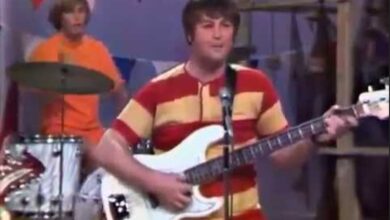The Zombies’ ‘Tell Her No’ – A British Invasion Gem That Stood the Test of Time
By the mid-1960s, British rock bands were dominating the international music scene, and The Zombies were at the forefront of this musical revolution. In December 1964, they released Tell Her No, a sophisticated and melodically rich single that would go on to become one of their defining tracks. Though it achieved only modest success in the UK, it made a significant impact in the United States, climbing to No. 6 on the Billboard Hot 100 by early 1965. With its jazz-infused structure, haunting harmonies, and intricate composition, the song solidified The Zombies’ reputation as one of the most innovative groups of the British Invasion.
The Zombies formed in St Albans, England, in 1961, comprising Rod Argent (keyboards, vocals), Colin Blunstone (lead vocals), Paul Atkinson (guitar), Chris White (bass), and Hugh Grundy (drums). Unlike many of their contemporaries who leaned heavily on rhythm and blues, The Zombies distinguished themselves with a refined, jazz-influenced sound, marked by intricate melodies and vocal harmonies. Their first breakout hit, She’s Not There, established them as a force to be reckoned with, but it was Tell Her No that reinforced their ability to craft timeless pop records with emotional depth.
Rod Argent, the band’s primary songwriter, drew inspiration from the songwriting prowess of Burt Bacharach and Hal David while composing Tell Her No. Wanting to create something with an unusual chord structure and a sophisticated melody, Argent crafted a song that revolved around themes of temptation and resistance. The lyrics carried an air of desperation, urging someone to reject an unfaithful love interest. While love songs of the era often leaned toward straightforward declarations, Tell Her No stood out for its perspective, making it an emotionally complex and compelling piece.
The recording of Tell Her No took place in late 1964 under the guidance of producer Ken Jones. The arrangement was meticulously crafted, with Argent’s delicate keyboard work forming the backbone of the song. Colin Blunstone’s lead vocals delivered a breathy, almost whisper-like quality, which added to the track’s vulnerability and distinctive mood. The band’s jazz-inspired chord progressions, combined with the precision of their harmonies, gave the song a sound that was more refined than the raw energy of many British Invasion records.
Upon its release, Tell Her No was met with positive critical reception. Music publications praised its innovative structure and melancholic beauty, describing it as a sophisticated departure from the more straightforward rock and roll dominating the charts. While the single only reached No. 42 in the UK, it resonated much more strongly in the U.S., where it became one of The Zombies’ biggest hits. Its success in America helped solidify the band’s international presence and contributed to their growing fanbase.
The song’s influence extended beyond its initial commercial performance. Unlike many hits of the era that faded from mainstream consciousness, Tell Her No continued to be a staple of rock and pop radio throughout the decades. Its elegant arrangement and heartfelt delivery helped shape the future of baroque pop and jazz-infused rock, genres that would be further explored by artists in the late ‘60s and beyond.
For The Zombies, Tell Her No was an essential step in their artistic evolution. While they faced challenges in maintaining consistent chart success, the song reinforced their commitment to intricate songwriting and harmonically rich compositions. This approach ultimately culminated in their critically acclaimed 1968 album Odessey and Oracle, which included the iconic Time of the Season. Though Tell Her No predates their magnum opus, it foreshadowed the musical sophistication that would become a hallmark of their later work.
The song has also inspired numerous covers and reinterpretations over the years. In 1983, country-pop singer Juice Newton recorded a version that brought the song back into mainstream attention, introducing it to a new audience. Other artists across genres have paid tribute to the track, often emphasizing its timeless melody and emotional depth. These covers further demonstrate the song’s versatility and enduring appeal.
Over time, Tell Her No has continued to find relevance in various forms of media, appearing in films, television shows, and commercials. Its use in soundtracks has introduced it to younger generations, ensuring that The Zombies’ musical legacy endures. The song’s delicate yet urgent plea remains universally relatable, a testament to its lasting emotional resonance.
Despite its success, Tell Her No is often overshadowed by The Zombies’ later work, particularly Time of the Season. However, its contribution to the band’s legacy and its importance in the British Invasion movement cannot be overstated. It was one of the early indicators of The Zombies’ sophisticated approach to songwriting, setting them apart from many of their peers.
Decades after its release, Tell Her No remains a defining moment in The Zombies’ catalog. Its haunting beauty, intricate structure, and evocative lyrics make it a standout track from the British Invasion era. The song’s longevity is a testament to the band’s craftsmanship and their ability to transcend the fleeting nature of pop trends.
As one of The Zombies’ most enduring songs, Tell Her No continues to be celebrated by fans and music historians alike. Whether experienced through the original recording or one of its many covers, the song’s emotional weight and masterful composition ensure that it remains a classic. Its journey from a 1965 single to a timeless piece of musical history speaks volumes about The Zombies’ enduring influence and the timeless nature of great songwriting.



